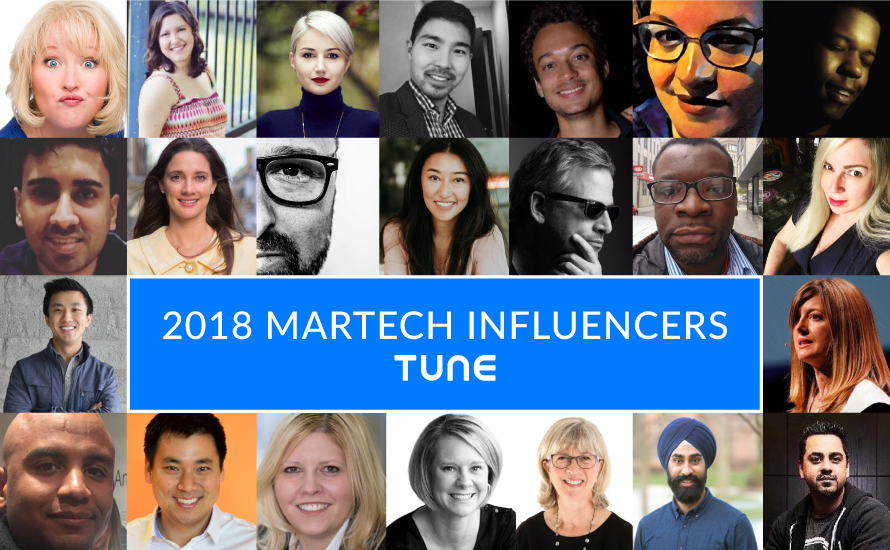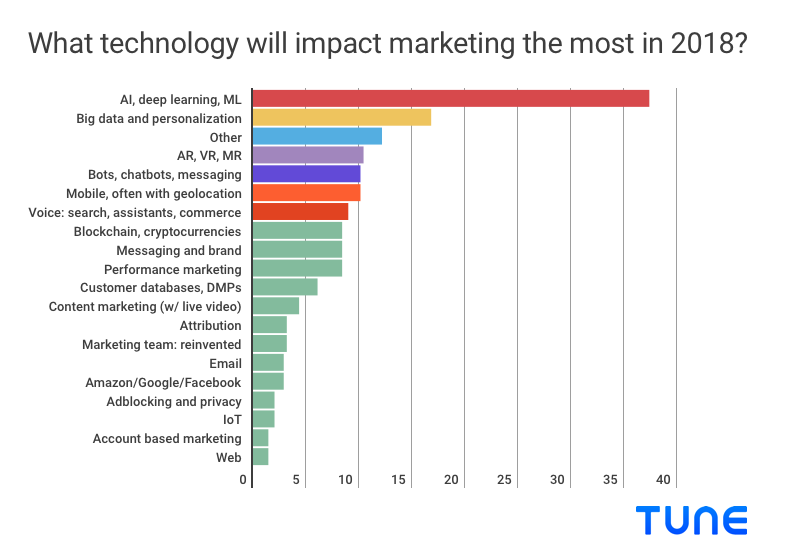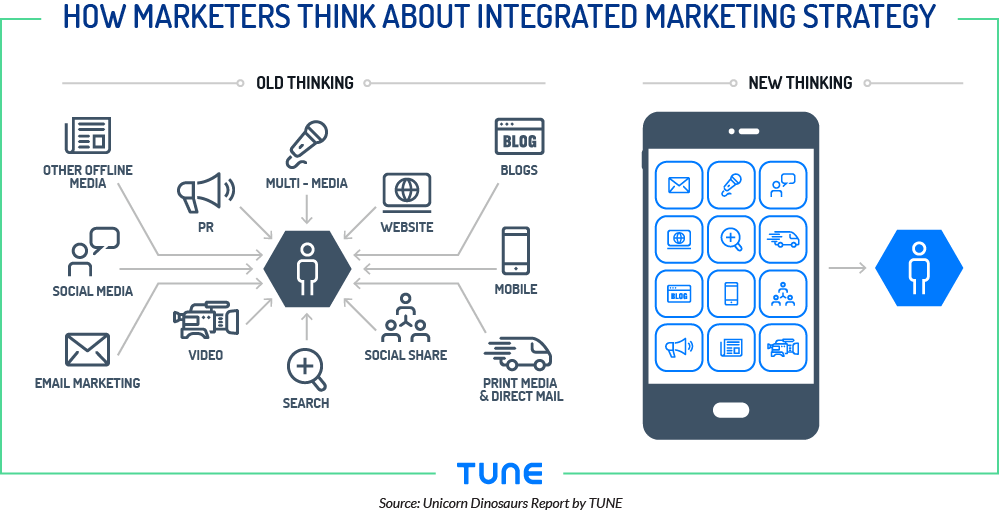
What technology will change marketing the most in 2018?
73% of marketers think it’s artificial intelligence or a technology dependent on AI. 20% think it will be voice-first technologies and smart assistants. 3% think it will be email, and 1.5% think it’s the good old fashioned world wide web.
A few others?
They think it’s the stupidest question anyone could ever ask.
Over the past two weeks I asked 345 marketers, CEOs, and influencers the same question: What technology or set of technologies will impact marketing the most next year?
Influencers like Joel Comm and Tamara McCleary responded, as did uber-analysts Jeremiah Owyang and Brian Solis. Academics like Julie Albright from USC and Stephen Andriole from Villanova School of Business answered, and top executives from companies like Salesforce, SAP, Optimizely, SAS, Segment, Dun & Bradstreet, and Microsoft also took out their crystal balls.
What’s the hottest tech in marketing for 2018? You tell us!
Join me for a Facebook Live conversation
This is a long blog post. Use the links here to navigate:
- Highlights and overviews
- The biggest bets: Top 10 technologies for marketing in 2018
- Insight at the edges
- Where’s mobile?
- And … just for fun:
- Key quotes: The top predictions
- Artificial intelligence, including deep learning and machine learning
- Big data and personalization
- Augmented reality, VR, and mixed reality
- Bots, chatbots, and messaging
- Mobile (often in conjunction with geolocation)
- Voice: search, commerce, assistants, user interfaces
- Blockchain and cryptocurrencies
- Customer databases, DMPs, data lakes
- Content marketing (including live video)
- Attribution
- Marketing team: reinvented, restructured
- Email
- GAFA (Google, Apple, Facebook, Amazon)
- Account-based marketing
- Finally, a word of caution: marketers don’t always do what they say
OK, let’s dive in …
Highlights and overviews

Seattle, home to one of TUNE’s 9 global offices
As you can see, AI is by far in the lead with almost 40% of marketers saying artificial intelligence, machine learning, or deep learning will be the most transformative technology for marketers in the coming year. Add to that bots/chatbots and voice search and assistants, which rely on various levels of AI for their intelligence, and you hit almost three quarters of marketers.

Perhaps just as interesting is the converging circles of data, intelligence, and messaging. Each of Big data, AI, a marketing database of record, and bots/chatbots intersect — or should intersect. This suggests interesting things about how marketers need to develop complementary technologies in tandem if not lockstep.

The intersection of AI,
big data, bots, and a customer database or DMP.
Without a marketing system of record — a customer and prospect database — any gains in big data analysis and personalization are limited.
Investments in bots to answer customer questions and handle low-level service and support tickets is great, but only when marketers apply machine learning to an extensive database of customer requests and solutions can it be anything more than a toy, or at most a tactic.
One obvious take-away?
If the customer is central to marketers’ efforts, data is paramount. No less than 64% of the technologies marketers list are data-driven.
One that’s not so obvious is that non-technological initiatives are pretty high on the list too, when you aggregate them. Messaging and brand is high, as are content marketing, reinventing the marketing team’s structures and processes, and account-based marketing (ABM).
This is at least partly a reaction to the increasing prominence of technology.
There’s a pull-back from marketers who want to emphasize art over science, and creativity over data. Critically, that’s not just from the old-school Madison Avenue types. Brandon Wirtz, CEO of not only a tech company but an AI company, said that “technology never changes marketing in a significant way,” and there’s others that agree.
The biggest bets: 2018’s top 10 marketing technologies

New York, home to one of TUNE’s 9 global offices
Clearly, marketers are infatuated with AI. But what about all the other bright shiny toys marketers dream about all day long?
Here are the top 10 technologies marketers think will impact marketing the most in 2018, along with the percentage of marketers who voted for them. (Note: the total is more than 100%, as marketers predicted multiple things about half the time.)
- AI, deep learning, machine learning: 37.4%
Marketers deeply believe that AI will make big data work for them in targeting, in understanding the customer journey, and in driving optimal ad-spend decisions. In some cases, they’re likely to be right.
- Big data and personalization: 16.8%
Marketers have a deep and earnest longing to communicate intimately with their customers like best friends, a million or two at a time. Using big data to — among other things — personalize communications — is high on the list. A few are making it happen even today.
- AR, VR, MR: 12.2%
Nothing says cutting edge like funky goggle helmets and real-time insertion of virtual objects into actual scenes, so augmented reality, mixed reality, and virtual reality are super-exciting to marketers who want to hit the next big thing. There are some success stories, though, so it’s not just all hype.
- Bots, chatbots, messaging: 10.1%
Communicating with millions individually while taking a coffee break? It’s easy to see why chatbots on messaging platforms are popular. It’s also easy to see some limited success in early adoptions of the technology.
 Mobile, often in conjunction with geolocation: 10.1%
Mobile, often in conjunction with geolocation: 10.1%
Mobile was the most interesting thing of just a few years ago. Now, it’s even more important, but much less visible. Why? It’s the setting where all the other interesting things happen.- Voice: search, assistants, commerce, user interfaces: 9%
Amazon’s Echo showed the way. Google Home is following. Apple’s Siri is in the game, and so are assistants and voice-first applications for information and commerce from Microsoft and multiple other companies, including many competitors in China. Many marketers see this as the next big wave.
- Blockchain, cryptocurrencies: 8.4%
Blockchain has the potential to change many industries, and advertising is one on the list. And blockchain-based cryptocurrencies aren’t just minting Bitcoin billionaires, they’re also providing insight into how we might transact business in the future. That, not shockingly, matters to marketers.
- Messaging and brand: 8.4%
Not all top technologies for 2018 are technologies. A significant number of marketers believe that the right brand, the right message, and the right creative marketing are more critical than the technologies you use to present them to consumers. And … they might not be wrong.
- Performance marketing: 8.4%
This is an interesting one — it wasn’t even a category I was thinking of or looking for. But, looking back on all the 20,000 words of responses to my question, performance marketing stood out in phrases like ROI, testing, conversion, and so on. Data enables creative decisions, but it also help marketers make the right calls financially.
- Customer databases, DMPs, data lakes: 6.1%
Marketing has never had a single system of record. That’s clearly about to change, as customer databases, DMPs for all prospect and customer interaction, and data lakes that enable coordinated access to customer data from multiple sources are getting more and more critical to marketers.
Insight at the edges

San Francisco, home to one of TUNE’s 9 global offices
It’s always fun to see the biggest, the most, the loudest answers from a group. It just might be the case, however, that there’s more insight at the edges.
Take this from Rishi Dave, the CMO of Dun & Bradstreet:
“Instead of a single technology, marketing will focus on evolving team capabilities and redesigning processes and organizational structures to take advantage of the rapid evolution of technology and data in marketing.”
 Or this from former Googler and current CEO of Profillic, Gaurav Ragtah, who says the big technology of 2018 is still mobile.
Or this from former Googler and current CEO of Profillic, Gaurav Ragtah, who says the big technology of 2018 is still mobile.
“The next billion people coming onto the internet are predominantly via mobile, and we’re seeing this through the rise of mobile messaging, mobile payments, mobile-optimized and ‘lite’ websites, and focus on video, voice, and location-based context, away from heavily text-based internet.”
It’s hard to argue with that.
And, it’s hard to argue with the former president of AOL Media Networks and current venture capitalist Mike Kelly, who says personalized marketing and multi-touch attribution are the next big thing:
“The macro will be a shift from using data to identify audiences to understanding the value of customers and prospects and rather than rely on last touch attribution use data and measurement to understand the customer habits across all platforms.”
These statements are typical of the most thoughtful — and experienced — marketers, who have been around the block a few times on the technological cycles we love to ride. Clive Bearman, the head of marketing at Lexumo — an extremely high-tech company — has something similarly counter-cultural to say.
 I’ve included it in full here, although it’s long, because it’s insightful:
I’ve included it in full here, although it’s long, because it’s insightful:
“I don’t believe there’s a singular technology or combination of technologies that will have a massive impact on marketing in 2018 at all. In fact I think we’re at a point where there’s technology fatigue in the marketing stack. I’m a B2B marketer and am seeing a definite trend from colleagues and peers to do less, but with more focus. Hence the rise and interest around account-based marketing. It’s a natural reaction to the incredible amount of technology that we now all have to work with. In many instances the ROI is simply unknown. I rolled out a VR game at a trade show with custom branding etc, but was hard to say if it increased traffic at my booth. A gregarious booth staffer could have probably achieved the same result.
That’s why old school tech of email is still such a trusted tool. You use data to identify your segments, send personalized email, and can track precisely when it was delivered, opened, read or disregarded. Email is still relatively cheap to operate and predictable to use. I don’t foresee anything replacing email in 2018, despite what the marketing chatbots have told you.”
And yet …
There are some amazing marketers out there on the edges of progress, doing incredible things and achieving incredible results. And, as all marketers know: the first to crack the secrets of marketing on new platforms often reap the biggest rewards.
Where’s mobile?

Tel Aviv, home to one of TUNE’s 9 global offices
One of the questions marketers might have when they see mobile in the fifth position of most-mentioned technologies that will transform marketing in 2018 is: how the mighty have fallen. Seeing that only 10% of marketers highlighted it could only exacerbate that impression.
But.
There’s a big caveat here. As we’ve recently talked about, mobile is fading into the background not because it’s less important than ever before, but because it’s more important. More central to our lives. More utilized for every little bit of everything digital we do.
That’s why I’ve said that “mobile’s not a channel … it’s an ecosystem within which all the digital channels increasingly live.”

Old-school marketers saw the world as it appears on the left. New-school marketers look to the right … they focus on people, not channels.
And they realize that almost all of the digital marketing channels that matters — email, social, web, apps, you name it — are entirely or mostly (and increasingly) consumed, created, and engaged with on mobile devices. Interesting … even the old ones like TV and radio are being impacted by mobile as a second screen, or a way to check out something interesting we’ve heard.
OTT is changing the game, too.
“Variants of the same tools we use for digital marketing will now be applied to broadcast TV,” says Keri Kukral, CEO of Raw Science Foundation.
Biggest buzzword salad

Seoul, home to one of TUNE’s 9 global offices
You don’t ask marketers for top technologies without expecting — and getting — a lot of buzzwords.
Marketers are notorious for jargon — think DSP, SaaS, KPI, freemium, omnichannel. And the tech industry is, if possible, even worse. After all, tech has given us such gems as solomo (social, local, mobile), SDKs, aqui-hire, and the most egregious of all: mocial.
So I was prepared.
But not for this: 22 buzzwords in one single paragraph.
Here it is, with the author’s name and company mercifully redacted:
Machine learning has already invaded marketing through customer and demographic profiling. Intelligent applications can profile customers — and brands — and update profiles by learning more and more about what preferences correlate with profiled data. Conversational speech is still a killer app, but it will not be the only way customers interact with brands and transaction platforms, like Amazon. Instead, conversations will be displaced by automated processes that know what customers want and when they want them: there will be a decreasing need to talk to anyone or anything. Digital assistants will run the show in five years. The phase one enabling infrastructure is already in place and will expand over time. Augmented reality, virtual reality and mixed reality will bring products and services to life, and help customers see and feel products and services the moment they proximate a buying decision. Mixed reality will win this race in the short run and smartphone-inserted AR/VR/MR devices will win the form factor race, displacing the need for another device, like headsets from Oculus or HoloLens. Mobile is a given for location-based services, AR/VR/MR and intelligent assistance. 5G will transform — again — the mobile experience — and that’s only a couple of years away. Big data will grow, as more and more unstructured data is collected and transformed into analytics treasure troves. Advanced — and then augmented (intelligent) — analytics will integrate and analyze massive structured and unstructured databases in real-time — the Holy Grail. But as augmented analytics evolves, marketing will become increasingly automated.
One free copy of Strunk & White coming right up.
Most blatantly self-serving predictions

London, home to one of TUNE’s 9 global offices
Everyone wants to promote themselves. Some are a little more elegant about it than others.
This might shock you, but a lot of email marketing vendors believe email is the most important marketing technology of 2018. A lot of streaming video providers think video is the new new thing. And a lot of vendors of all kinds — even project management tools — are quite sure that the thing their company just happens to do, is, amazingly, exactly the hottest thing marketers need right now.
And some of them might be right!
Email, for instance, does outperform a lot of channels historically.
But a lot of people have really drunk the kool-aid. Or, they are simply spouting what they know is nonsense in the faint hope that someone will believe them.
Most blatantly self-serving: first prize
What is the most important, transformative, amazing new technology for marketing in 2018?
Why, of course, it is … YACT … Yet Another Collaboration Tool (not its real name, of course).
[NAME REDACTED], an expansive collaboration solution that can be used to take notes, view project charts, review code and facilitate face-to-face interaction amongst team members — anywhere in the world, from any device. The perfect collaboration solution for marketers working on a project both in, and outside, the office.
Or not.
-
- First runner up: New domain names
(from a domain name provider)
- Second runner up: Streaming video at conferences and events
(from a streaming video provider)
- Third runner up: Electronic payments
(from a payments vendor)
- Fourth runner up: The comeback of direct mail and catalog marketing
(from … you guessed it …)
- Fifth runner up: Push notifications
(from a … yep … )
Wildest leaps of logic

Berlin, home to one of TUNE’s 9 global offices
Asking for predictions is dangerous. People put their thinking caps on, but sometimes they’re lined with tin foil. Other times, they just might be lined with something else.
In some cases, that leads to wild leaps of logic.
This prediction jumps from the probable to the interesting to the unrelated to something quite different. Here’s the sequence: AI > social and search > targeting > self-driving vehicles > to bricks and mortar retails.
I’m not saying it’s not all happening, but I’m not exactly following the leaps here:
“The technology that will have the biggest impact on marketing in the next year is AI. Google and Facebook will offer much more advanced services as a result of developments in AI in 2018. More advanced neural networks will be able to do much more to help brands conduct sharp targeting and implement more effective campaigns. But, more revolutionary changes in marketing will really be more like 5-10 years out. Autonomous vehicles will have a dramatic impact during that timeframe. Transportation costs will drop dramatically with self-driving cars. With rides in the $2-$3 range, costs become comparable to impressions – but instead of paying millions to build a funnel, businesses can pay for consumers to travel directly to their establishments.”
(The name has been redacted for obvious reasons.)
Runner-up: IPFS.
Interestingly, two very smart and insightful futurists referenced an acronym that likely 99% of marketers do not know: IPFS. IPFS is the Interplanetary File System, and it is an open-source protocol designed for permanent distributed storing and sharing of files.
As interesting and potentially revolutionary as IPFS might be, I’m not quite buying that it’s a major transformative technology for marketing in 2018.
The most fantabulistic of marketers’ fantasies

Tokyo, home to one of TUNE’s 9 global offices
Marketers love targeting the right messages to the right people at the right time. This is wonderful and excellent, and getting better at targeting could indeed make advertising immensely better.
But.
There is a limit to targeting. There is such a thing as privacy. And there is such a thing as your prospects feeling creeped out when you go too far.
Like this prediction, from which NONE WILL EVER ESCAPE:
“Marketing is on the cusp of a new world of hyper-targeting. Ads and promoted messages will follow customers across their devices and into their homes. And voice-controlled smart speakers and AR-enabled glasses — even simple Google searches — will offer marketers more ways than ever to get in front of their customers. Marketers will share their brand story, as well as customized messaging based on traditional data (location, demographics, past purchases) and newer data points, such as mood and proximity to others, that will not only increase conversion, but also drive a larger conversation about privacy and data collection.”
Bloody right that future will drive a larger conversation about privacy and data collection. A much, much, much larger conversation.
All the predictions in exhaustive depth
What’s the hottest tech in marketing for 2018? You tell us!
Join me for a Facebook Live conversation

Gurugram, India, home of one of TUNE’s 9 global offices
Artificial intelligence, including deep learning and machine learning
| 2018 will see an increase in AI investments among marketers.
AI enables brands to differentiate by delighting customers in a more personalized and timely manner as it bolsters existing marketing automation capabilities at scale.
What’s key to note, however, is that the technology alone won’t lead to success. The brands that leverage AI the best will be those with exceptional digital marketing talent who understand customer needs and who are driven by a performance-focused culture. They will be manically focused on metrics to inform where they can optimize customer experiences in real-time. |
Mika Yamamoto
Chief Digital Marketing Officer, SAP |
| Artificial intelligence (AI) has been around for decades, but has seen a resurgence as data size and diversity continue to grow.
This growth in data has fueled more algorithmic and real-time approaches to addressing different business issues, and customer experience in particular. The nexus of big data analytics and the various forms of AI, including predictive analytics, machine learning and deep learning, underpin well-informed and efficient customer interactions that benefit both customers and businesses.
Through AI, CMOs will have to adapt and evolve their strategies through exposure to new data over time, and play a critical role in business’s ability to intelligently transform existing processes without being limited by the speed of humans. |
Wilson Raj
Global Director of Customer Intelligence, SAS |
| AI and machine learning will have the most profound impact on marketing in 2018 because it will fundamentally make “marketing” more human.
Which is ironic in and of itself. |
Brian Solis
Principal analyst, Altimeter, speaker, author |
We live in a ‘rules-based’ marketing world.
- Which landing page does better?
- Which leads should be scored higher?
- What segment should we target an email or ad to?
Smart marketing technologies are introducing a level of AI in their systems to help figure this stuff out so that we’re not just guessing using static rules. |
| Marketing leaders are realizing that to meet consumer expectations around personalization and real-time, relevant, contextual content, they’ll need to turn to AI for help.
High performing marketers are already leveraging AI to better understand consumer behavior and make predictions about how customers are likely to interact with their brands, so they can meet each individual customer where they are in their journey. |
Meghann York
Director of Product Marketing, Salesforce |
| The impact of A.I. and data science to hyper-personalize the experience today is becoming more important than SEM and SEO optimization, especially when you consider how saturated search has become.
By tapping into A.I. and machine learning, marketers and brands have an opportunity to deliver progressively better customer experiences that are frictionless, contextual and personalized to customers – based on where they are and what they’re doing in the moment. |
Thom Gruhler
CEO, Fjuri (former CMO of Microsoft Windows) |
| AI will without a doubt be the technology that has the most impact on marketing going forward as it allows marketers new capabilities to interact with a huge number of people on a personal level that could never have been done before. I would even go so far as to say that AI is also necessary to the survival and effectiveness of marketing as today’s consumers are much more tech savvy and blind to many traditional marketing techniques due to the constant bombardment they have dealt with for so long.Marketing can no longer be a one-way message to customers, but a conversation that allows for engagement and interaction. People don’t want to be sold something, they want to be engaged with and offered advice on how new products and services can better improve their lives and businesses. The key for marketers is going to be to leverage AI and machine learning to ensure that their chatbots understand the individual habits of their customers and provide them with useful content and information for their daily lives that aren’t overtly sales-related. |
Mahi deSilva
CEO, Botworx.ai |
| We’re in an era of artificial intelligence (AI). As marketers increasingly utilize AI to scale communications in 2018, brands must be selective and chose to automate tasks that make the customer experience more human, not less.
The right social media technology should free up real, live people to spend time on interactions that really require a human touch. Social media’s differentiator has always been the human element and AI will only strengthen that. |
Penny Wilson
CMO, Hootsuite |
| Without a doubt, the biggest impact which we will see in marketing will come from a specific branch of AI, Deep Neural Networks, combined with Big Data.Essentially, we are already in an age where we have a ton of data about our leads and customers.
But we’re not using this data enough, because, simply put, there is too much of it for us to make sense of it.
That’s where Deep Neural Nets can become a game-changer. DNNs can be used to cluster and classify this big data at massive scales to help us understand it, something which we are unable to do right now.
More importantly, we can be able to take action with that new information. |
David Attard
Founder, CollectiveRay |
| Machine learning and artificial intelligence will make the biggest impact on marketing in 2018 – specifically in the retail sector, whose marketing complexities have grown far beyond human capabilities. Humans alone can no longer manage thousands of SKUs, promos, dynamic pricing stockouts, and more, simultaneously. |
Kerry Liu
CEO, Rubikloud |
| Marketers will embrace machine learning as personalization at scale becomes a key imperative in 2018. Brands have been using traditional propensity models for decades to segment their customer base. The problem is that consumer experience expectations are changing. Our real-time world requires real-time relevance for our customers at every touch point.
Brands understand this rapidly changing dynamic and research shows that by 2020, 89% of brands say they will compete primarily based on the experience they deliver to customers. 2018 will be the year that brands begin to adopt machine and other automated learning techniques in order to build and sustain contextual relevance with their customers. Unfortunately, not every marketer will move quickly enough and fall behind. |
Dale Renner
CEO, RedPoint Global |
| There is little doubt that Big Data married with AI will be the marketing technology story of 2018. That powerful combination will continue to make huge strides in optimizing ad targeting, creative design, and marketing offers where results are measured with hard metrics like clicks and purchases.
But at the same time, marketers have been honest about not really trusting their data for some time now, and the availability of AI hasn’t solved that issue – in fact, in some ways it has gotten worse. The problem marketers will face comes from extending proven AI-only tools to trying to measure the softer sides of marketing like brand perception.
The promise of AI is that you don’t need to code, you just need to teach. Marketers will quickly learn that AI alone is not a ‘set it and forget it’ technological trick to doing less work. In 2018, marketers will need to focus on the quality of the data behind the screen – making sure they can trust what they see. |
Eric Koefoot
CEO, PublicRelay |
| Unlike humans whose brain naturally deteriorates with age, bots and AI in general is only getting smarter and more personal as it ages.
While many aspects of marketing cannot and must not be automated, many of the elements of our workflow will be fully automated using AI. This will increase efficiency and effectiveness while saving time and upping our productivity. |
Hillel Fuld
Co-founder, Zcast, CMO, Influencer |
Big data and personalization
| Data is absolutely the new engagement currency for marketers and the most important type of data is customer behavioral data – what you do tells a brand more about your intent than who you are in a buying cycle.
Why?
Behavioral data is imperative in learning about a customer at every step of their journey and driving deep personalized experience across channels. This means leveraging data not just from an acquisition perspective but also across the lifecycle to programmatically drive adoption, retention, cross sell, and advocacy marketing initiatives.
In 2018, marketing teams will need to use and optimize deep behavioral data insights to determine the ideal customer profile and channels of choice for each buyer; and then use powerful, personalized stories to build connections for life with each customer. |
Chandar Pattabhiram
CMO, Coupa |
| For many in the last two years, including at Hylink’s R&D labs in San Jose, Xi’an, Beijing, and Chengdu, the focus has been to make sense of the immense amount of data that we have at our disposal as well as the reactions to data that are currently being served to our audience.
We know our audience and collect a vast amount of data on their typical and quantitative behaviors. Then, we serve them advertising, and collect more data on their reactions (percentage of opens, secondary actions, successfully served ads, positive/negative responses). When we attempt to make sense of the data, however, it becomes extremely difficult because it accumulates to about 10 billion data points a month.
The next battleground for marketers, therefore, will be to demand their agencies and their tech platforms be able to use AI to determine not only if an ad is worth serving, but also if an ad should be served to a group of users that is a lost opportunity for a marketer who was likely making decisions the old-school way – by defining a target group, income bracket, geography, tagged behaviors, or past browsing instances that aren’t live. |
Humphrey Ho
Managing Director, Hylink |
| AI, Blockchain, and AR are all tools to achieve desired outcomes but require data to do so.
You are going to see more marketing teams start to dive in to data and start making data driven decisions on what their customers and users want just like Amazon and Netflix do. |
Ray Walia
CEO, Launch Academy |
| The most important technology in 2018 will be leveraging big data to bring value-drive experiences to your customer base and your prospects.
Content creation and distribution has become a core need of brand trying to establish a name for themselves in the market. Big data allows these companies to not only produce to the demand but also to better understand needs, wants and aspirations of their communities.
We want to be able to understand where lack of knowledge or understanding lies so that we can provide content in the form of Instagram posts, blogs and influencer partnerships to answer the questions that need to be answered and also to portray our brand values in locations and settings that resonate. |
Michael Kliska
President and CEO, Joe Grooming |
| As artificial intelligence and machine learning continues to make their way into marketing automation in 2018, individualization will become the new personalization. The message, timing, and delivery channel will all be personalized tactics, which will create a demand for individualized marketing experiences. Marketers will be able to take personalization to the next level by using marketing automation to track the behaviors of their buyers and machine learning to identify optimal windows for engagement.
The General Data Protection Regulation (GDPR), scheduled to go into effect in May 2018, will have the biggest fundamental impact on marketing in the last decade, and the biggest impact on how companies go to market since the invention of the cloud. The onus is on marketing technology providers to ensure that their users have access to the tools they need to market safely and securely in the new world of marketing under the GDPR. |
Michelle Huff
CMO, Act-On Software |
| 2018 will be the year where companies apply their extraordinary amount of data to improve the customer experience. You’ll see this in two primary ways: machine learning and artificial intelligence will drive a more efficient and personalized customer journey, and augmented reality will make the customer experience more vibrant by allowing consumers to fall in love with a product in ways they never could before. |
Jim Lyski
CMO, CarMax |
| CMOs in 2018 will be desperate to understand their customers to a level they never have before, using data that was previously unthinkable.
Companies will explore hyper-personalization to engage customers across even more channels, using data to deliver more tailored and more targeted content, products, and services. |
Merijn te Booij
CMO, Genesys |
| While big data has been front and center for some time now, we have barely scratched the surface of the value data can provide.
Traditionally, the focus has been on general purpose BI tools.
In 2018, we will see more focus around vertically integrated tools, like marketing, that turn a known set of data into actionable insights. Data-driven insights that drive key business value will continue to get more attention over pure BI tools. |
Adnan Mahmud
CEO, LiveStories |
Augmented reality, VR, and mixed reality
| Marketers will finally figure out how to use mobile AR and immersive VR to sell products, and people are going to generally hate those experiences but they’ll do them anyway because it will be their first taste of the mixed reality future.
Technology for marketing will be very flat in the innovation department: if AR glasses do show up it will be all hype and no real reward till 2020 when hardware and content development catches up to the hype. |
Dulce Baerga
CEO, River Studios |
| I predict that Augmented Reality Product Showcasing will change marketing the most. It won’t be commonplace in 2018, but it will generate abundant conversation and measurable success for the early movers. |
Shel Israel
CEO, Transformation Group |
| I believe it’s not the technology but the brands/companies pushing the markets into certain directions and at this point companies like Facebook and Apple are pushing people more into AR.
This can have a lot of impact on brands and marketing in general, especially with empowering platforms such as the iPhone with native AR, and Facebook with AR studio and the Camera platform. |
Sherif Kozman
CEO, ExtremeSolution |
| For 2018: Tech that will allow for complete and seamless retail fulfillment via mobile AR. |
Irena Cronin
Head of Research, Transformation Group |
| Short-term the technologies that will have the biggest impact on marketing are the ones with the greatest benefit to the customer.
As a homebuilding company, we are employing digital renderings and virtual reality tours of our homes, so that our buyers can make more informed decisions. Long-term artificial intelligence will be transformational, and will be implemented at almost every touchpoint. |
Rob Krohn
Franchise Marketing Manager, Epcon Communities |
Bots, chatbots, and messaging
| Marketers should take note: consumers want to chat with businesses on their phones and are becoming more and more open to live chat systems and messaging bots.
Creating bots that answer questions quickly and efficiently and even automatically qualify leads will be a top priority for marketers in 2018. |
Allie Tetreault
Content Strategist, TOAST |
| The engine powering conversational marketing is artificial intelligence. AI stands to be the ultimate disrupter for companies of all sizes.
It takes on many forms, but common to marketers and growing in prevalence are intelligent conversational chatbots — also known as intelligent assistants, conversational assistants, digital employees and virtual assistants. |
Andy Peart
CMO and Chief Strategy Officer, Artificial Solutions |
| I think it’s going to be mobile messaging.
It might not be the sexiest tech when AI and VR flood the media, but small businesses are flocking to mobile messaging in droves. They’re texting and messaging to gain leads, follow up on sales, promote events, share info, get reviews, provide better customer service, and even chat with customers the same way friends do.
With millions of American small businesses already using or actively looking for a good way to engage and communicate with customers on their smartphones, I think mobile messaging is going to have the biggest impact on marketing in 2018. |
Kenneth Burke
Marketing Director, TextRequest |
| AI has been implemented in the big leagues with Apple’s Siri, Amazon’s Alexa and Google’s Google Assistant. This has changed the way users interact with their mobile devices.
Another form of AI-powered devices will be chatbots and they will change how enterprises use, receive, share and understand data.
Chatbots are efficient and allow for analysts and business professionals more time to do the hundreds of other tasks needed. |
Adrien Schmidt
CEO, Bouquet |
| Chatbots and its associated AI will have the biggest impact on marketing in 2018, and it won’t be good.These new systems give marketers the ability to scale their efforts and broaden their reach. However, non-marketers consider live chat and direct messaging as an inherently one-on-one human interaction.
Once upon a time, long ago, the telephone was considered a personal form of communication. Anytime the phone rang, we answered. We would race to the phone to see who was on the other end before they hung up. Then, marketers got hold of the telephone. Today, unless we recognize the number, we ignore every call, and it’s thanks to automated robo-systems we all love to hate.
It’s a repeating cycle. The front door, the telephone, email, and now live chat is in the marketer’s crosshairs. The landscape of personal chat will undergo a dramatic change for consumers in 2018. |
Daniel Davidson
CEO, Bydan |
Mobile (often in conjunction with geolocation)
| The next billion people coming onto the internet are predominantly via mobile, and we’re seeing this through the rise of mobile messaging, mobile payments, mobile-optimized and ‘lite’ websites, and focus on video, voice, and location-based context, away from heavily text-based internet.
This proliferation is happening through huge price drops in data access and android devices — especially in emerging markets (like India), where the vast majority are neither literate nor traditionally tech-savvy, but are extremely active participants of the economy. |
Gaurav Ragtah
Founder, CEO at Profillic |
| The combination of location-based services (LBS), augmented (intelligent) analytics and always-on smartphones will be deadly.
It will allow sales and marketing teams to locate customers, know what they like and instantly pitch them deals.
Managing the entire customer journey is the objective, and automated tools working together will enable more — and more profitable — transactions. |
Stephen Andriole
Professor of Business Technology, Villanova School of Business |
| The biggest thing for 2018?
The ability to make personalized offers in real-time. Whether it be through a mobile app or SMS, coupons or special offers … real-time will be key. |
Sarah Wallace
Director, Service Enablement, AI & Analytics, IHS |
| Our phones know where we are at all times.
I expect geolocation technology integrated with real time location sensitive advertisements will have the biggest impact on marketing in 2018. Sending out personalized offers to individuals who are in close proximity to your store based upon their interests and buying history will continue to revolutionize how we shop.
Stores can maintain customer profiles and suggest items, similar to how a friend would. As these offers become more valuable and relevant to their interests buyers will begin to trust them more and jump at the chance.
This will have the biggest impact on marketing in 2018 since it further allows retailers to market to individuals, not audiences. |
Stephen Gibson
Founder, Vyteo.com |
| I’d actually say the biggest technology to affect marketing in 2018 will be Progressive Web Apps.
Why?
Because they have the potential to overtake both the native app and the mobile website. It’s a bold statement – but the ‘best of both’ solution offered by a PWA has a lot of upside, and not a great deal of cons.
As consumers, we’re growing more and more impatient. Whether you like it or not, people expect a website or app to load near-instantly. PWAs do just that – and offer the superior ‘app-like’ experience that we know mobile users prefer.
A plethora of big name brands are adopting PWA as their preferred way of delivering their online experience to mobile. The likes of Wired Magazine and Lancome are putting their faith in the tech.
But the main reason I think PWA, over the likes of VR, AI and Big Data, is going to have the biggest effect on marketing next year is that it’s far-reaching. Across the developing world in areas with patchier internet connections, PWAs have been dominating quietly for a short while, with eCommerce giants in Asia and Africa seeing their results skyrocket. |
Ian Naylor
CEO, AppInstitute |
| Mobile continues to be the center of consumers’ world, and is the portal for their use of most other technologies at this point from augmented reality to email and social media.
We should see a great deal of growth next year in both use of AR and use of data analytics and AI for personalized messaging. |
Ben Bloch
Chief Marketing Officer, Admit 1 Studios |
| In 2018 also, mobile is going to be the core of success and future challenges.
With screen shrinking and search queries getting longer and unique, thanks to voice search, digital marketers are going to keep wondering and shooting in the dark. Remarketing is going to see a further boost. Programmatic, a less familiar mode, will see more takers.
For local businesses, the Google pack is going to be even trickier. |
Chetan Saxena
Digital Marketing Head, Digital Success Dallas |
| The biggest tech for marketers in 2018?
Correlating in-store purchases with online ads. |
Yoel Israel
Digital Marketing Executive, WadiDigital |
Voice: search, commerce, assistants, user interfaces
| Most transformational technology for marketers in 2018?
Smart voice systems enable marketers to connect to customers from anywhere: Car, kitchen, the bedroom, and on the go.
Interfaces aren’t as relevant as we can now interact with audio. |
Jeremiah Owyang
Principal Analyst, Kaleido Insights |
| Voice technology, with AI, will transform marketing in 2018.
According to eMarketer, 45 million voice-assisted devices are already in use in the United States. Every smartphone device now also includes voice assisted technology. Next year consumers won’t have to lift a finger to have all their requests fulfilled, whether the request is discovery of information or intent to purchase. They will be able to talk to inanimate objects inside and outside their homes and access a world of information.
The specificity of voice search leads to more personalized results – which will allow for more relevant marketing and targeted advertising. |
Jennifer Wong
VP Marketing, TUNE |
| As marketers dive into immersive experiences using AR/VR technologies, not to be forgotten is the power of Voice AI and the role of voice search in decision making. Opportunities exist for marketers to create functional yet compelling voice enabled experiences to position their brands ahead of the competition.
The physical world has become a voice activated interface where consumers’ power is shifting from their fingertips to their voices … |
Kyra Barker
Digital Marketing Consultant |
Post-app technologies will disintermediate marketers.
- What happens to CPG marketing when we’re ordering detergent by merely saying, “Alexa, get me more laundry soap”?
- What happens to content marketing when stories are automagically presented to you by Apple, Samsung or Verizon when you unlock your phone?
- What happens to app marketing if we no longer have to download apps or open them up?
These examples illustrate the new and massive challenges marketers will encounter with new “post app” technologies like voice assistants, proactive content delivery on smartphones, or embedded apps in Facebook or iMessage.
The customer acquisition, customer retention and market share challenges for brands like Tide, Crest or Uber will shift dramatically as new technologies increasingly disintermediate old marketing channels.
We will remain dependent on our devices for both utility and leisure, but “post app” technologies will increasingly push apps off the top of the totem pole, bringing in a host of new challenges for brands of all types. |
Greg Wester
SVP Marketing and Business Development, Mobile Posse |
| AI will be used to leverage customer data in real time in order to drive more personalization for consumers. Additionally, text and voice driven bots will be used by brands on websites, apps, and social platforms to deliver highly relevant, 24/7 assistance for FAQs as well as shopping decisions.
With artificial intelligence leading brands are using advanced Conversational Commerce products that let the consumer use natural language to search and discuss their preferences with a sophisticated bot that can help them determine what is right for them.
At WayBlazer, in coordination with Emirate Vacations, we have developed Emma, a virtual assistant that delivers a conversational interface for travelers, understands their intent and provides instant and personalized recommendations based on each user’s needs and extensive travel data. |
Terry Jones
Founder and Chairman, WayBlazer (founder of Travelocity and Kayak.com) |
| Fueled by mobile and the smart speakers flooding the market, voice-based interactions will ultimately have a profound impact on the customer experience and how brands market in the coming age of natural user interfaces and intelligent personal assistants. Voice is gaining ground as a preferred means to search on mobile, and has an especially significant opportunity to unlock the “impulse buy” and replenish needs in the home.
However, major platform players who are laying the groundwork for voice also have the most to gain and lose, and many will be willing to give up marketing and advertising revenue in the hopes of gaining early market share when it is most precious. Once platforms leaders emerge at scale with voice, marketing opportunities will open up with rich customer data and preferences for brands to target.
In a time of intense competition, millennial buying power, and cheap start-up costs, winning brands will invest on crafting more intelligent experiences that create stronger bonds, especially with current customers. The brands that get experience right will capitalize on the fallout from the brands that don’t and continue to grow.
The biggest impact that brands will start to better realize in 2018 will be in reinventing their core customer experience in a mobile-first, contextually-aware way. |
David Hewitt
Group VP, SapientRazorfish |
| Conversational interfaces will dramatically change marketing — both the design patterns of those experiences as well as the cross-organizational nature of those interactions (blending marketing, sales, service). |
Scott Brinker
“Chief Martech,” VP Platform Ecosystem, Hubspot |
| 2018 will mark the year of Post-Phone World: human-computer interaction will soon be screenless.
Thanks to Alexa and Siri, visual and voice search is rapidly increasing in popularity and on the way to being dominant mobile search modes. And on the heels of the iphone 10 is the new Apple Watch Series 3, which is a big deal because it comes with LTE cellular connectivity. This means that—when coupled with AirPods—it will become the first truly credible post-phone internet device.
Series 3 + AirPods makes all the things we currently use our phones for—playing music, text messaging, making phone calls, getting directions, or ending a debate with a Wikipedia factoid, possible without your phone. |
Aaron Shapiro
CEO, Huge |
| 40% of adults use voice search at least once a day.
Marketers (retail in particular) are going to have to pay attention to how they want to capture this traffic. Currently, we don’t see a lot of people focusing much on it so we think that the early bird will definitely catch the worms.
It appears that voice searches not only contain more words but also may be more targeted towards what a user is expecting to see … so it will require a different approach. For example, where previously a clothes company could optimise for ‘Black T Shirts,’ they may now have to consider things like “where is the cheapest black t shirt?” We also think there will be much more intent to searches than there is currently. Terms like ‘where,’ ‘how,’ ‘why,’ and ‘when’ will all feature much more prominently.
In short, we feel that online marketing in 2018 will have to shift focus even more towards answering people’s questions and solving people’s problems, as a direct result of voice search. |
Dave Gregory
SiteVisibility |
Blockchain and cryptocurrencies
| Advertising is full of waste, fraud and other externalities. One externality is that people’s privacy is being stolen and money is made selling that to advertisers.
By introducing blockchain technologies, users can control their data, while advertisers can get a more reliable product. |
Miko Matsumura
Founder, Evercoin |
| Blockchain will be everywhere.
We’re already seeing it with all the crypto news these days, and in some small adtech applications, but I feel that this will open up to a lot more. |
Tim O’Neil
VP Marketing, Adcolony |
| The most transformational technology for marketers in 2018?
“Blockchain. Period.” |
Joel Comm
Author, speaker, entrepreneur |
| The most transformational technology for marketers in 2018?
“Blockchain.” |
Hermione Way
Brand Consultant |
| There are many technologies that will make impact next year but the most interesting one is the rise of blockchain.
By enabling marketers to conduct transactions in a secure and transparent marketplace, blockchain has the potential to solve for many industry issues. With blockchain, the end-to-end processes of booking, buying, and placing digital ad space will be recorded and stored.
And because all these transactions would be available to the public and verified by common consensus, blockchain will help bring about greater transparency and end ad fraud. |
Greg Isbister
Founder & CEO, Blis |
| The biggest tech that will impact 2018 will in no doubt be crypto-currency.
If it’s something that for the most part has been avoided by the mass market, we’re going to start seeing crypto integrated into more and more products and services.
We’re already starting to see the adoption of virtual currency at brick and mortar businesses: 2018 will see this trend ramp up. |
Oren Todoros
CEO, BigIntro |
| I think the important emerging technology for marketing in 2018 will be the blockchain browsers – which are still in their early stage, like Metamask.
These will form a bridge from the Internet to the blockchain, enabling an entirely new market ecosystem to be accessed by consumers. |
Julie Albright
Digital Sociologist, USC |
| This week saw the formation of the first agency to be powered by blockchain technology with the launch of Truth (part of TMG group). They are promising to allay some of the fears CMOs like Marc Pritchard from P&G have recently been alluding to around transparency.
Powered by Ethereum, a blockchain technology, smart contracts are written into a ledger securely and transparently. At SHARE, we are working on smart contracts with a subscription pricing product. The overarching idea will be that client payments can be triggered as KPIs or deliveries are met, saving time processing contracts manually and giving both agencies and clients full transparency of transaction.
Most people have started to hear about Bitcoin currency, but Ethereum and other blockchain technologies are starting to gain credibility by being implemented by global brands on a daily basis. Only this week, American Express announced that they will be processing cross-border payments using Ripple (XRP is the currency symbol). This news created a huge surge in the price of XRP of more than 20%. You wouldn’t get that in a standard bank account now, would you! |
Ian Cassidy
CEO, SHARE Creative |
| With Bitcoin going mainstream, e-commerce sites will want to quickly jump on board.
Instead of spending years coding their own solution, I predict they will adopt Wampum Register to be able to take bitcoin transactions in person and online.
It’s a game changer for any business that wants to cut their credit card transaction fees and move boldly into the future of crypto. |
Adryenn Ashley
CEO, Loly |
Messaging and brand
| In the current context where individual privacy concerns are coming back with a vengeance (see GDPR, private browsers, etc), there will be a technology shift whereby personal data becomes more protected, and its uses less mercenary.
Marketing might have to learn to do without that crutch.
We have been so sure in the knowledge that our campaigns would fall on interested ears – we’ll have to go back to the basics and make sure the marketing messages we craft are actually in the general interest of the public.
That is a good thing. |
Anna Winterstein
CMO, Smarter Time |
| I fundamentally believe the constant chase for the latest tech trend gets in the way of building a strong brand.
I think smart brands will be doing a better job of using their VoC and customer insight to understand what drives customers’ satisfaction, loyalty, and advocacy.
I don’t know that many brands will do this, but I think it’s the thing that can drive the best strategies toward long-term brand health. |
Augie Ray
Senior Analyst, Gartner Research |
| The most transformational technology for marketing in 2018?
“It will still be mostly understanding of human psychology. The rest is just decoration.” |
Max Gorbatenko
Managing Member, Muscle Computing |
Customer databases, DMPs, data lakes
| The emergence of customer data platforms will have the biggest impact on marketing in 2018.
This is the idea that every company needs a unifying data hub that integrates anonymous data across every touch point in the customer journey, all the way from top of the funnel through the life cycle of the customer.
In order to deliver the experiences that customers expect, companies will need to find ways to stitch this data together, build an intelligence layer on top of the data and use that intelligence layer to power all of the the different channels of engagement that they have with customers, whether that be an ad, online, email, or text message or push notification. |
Ashu Garg
General Partner, Foundation Capital |
| If 2017 was the year of data, 2018 will be the year of customer data infrastructure.
Consumers now interact with businesses on an endless amount of channels: in email, advertisements, social media, push notifications, in-app, or even in-store. This creates a new, interesting problem: While businesses now have more data than ever before, they are now restricted by their own technological capabilities to pipe all this data in one place and synthesize it. Turning around and activating those insights in an optimized, channel-agnostic manner is the holy grail of marketing.
This year, there will be race between brands to get closer to this vision and build infrastructures that can connect, collect, and act on their data in real-time. The businesses that start to execute on this vision successfully, will reap the rewards, including a true competitive advantage. |
Peter Reinhardt,
CEO, Segment |
| In the year ahead, Data Management Platforms (DMPs) will continue to be a big and valuable investment for marketers as data is key to delivering personalized experiences across all channels.
But, not just any DMP. DMPs that cut across both digital advertising and marketing, as well as commerce and other products, will make the biggest impact in 2018.
Key to a successful DMP is data.
Without it, it’s impossible to deliver on the promise of AI and provide curated experiences to consumers across advertising, email marketing and more. Data is a key brand differentiator and how well marketers capture it and turn that knowledge into relevant content, products and information for consumers is contingent on their data prowess.
DMPs that operate across the entire marketing universe make a flood of consumer data available to marketers that may have once considered themselves data poor, and are a catalyst for organizational realignment around the consumer. DMPs that can do this, can help brands truly know their consumer and ultimately, drive intelligent consumer engagement strategies. |
Raji Bedi
Vice President, Product Management Marketing Cloud, Salesforce |
| The most important tech for marketing in the coming two to three years is Data Analytics.
Although few non-traditional marketers now are benefiting from it, I think it start have more momentum in 2018 and will be mainstream within 3 years. |
Ahmed El Komy
Senior Solution Specialist, Hololens, Microsoft |
| For 2018, we see two major trends surfacing.
The first is the increased urgency to consolidate all customer data into a single repository, which has led to rise of Customer Data Platforms (CDP). CDPs put all of the data that businesses have on consumers, across all channels, into a single, marketing-owned database.
Bringing this information enables marketers to gain 360 degree views of their customers across all channels, and segment their customer database using a variety of attributes. |
Bob Boehnlein
CEO, QuickPivot |
Content marketing (including live video)
I think that there will be three dominant forces in marketing:
- Easy content generation and livestreaming video for events/meetings
- AI for matching and smart syndication of that content
- Platforms that bind subscription and behaviour on mobile platforms (predominantly smartphones and phablets)
Imagine everyone being like Gary Vaynerchuk pumping out content and through visual and audio AI processing being pushed to people wanting to mine the wisdom of both influencers and the crowd.
This firmly puts brands in the position of having to build trusted networks of advocates and customers that will represent every part of their brand experience.
The flipside will be that companies will need to redefine their customer experience and bolster through smart, and real-time, marketing execution. This is also why Google/Youtube, and Facebook/Instagram will become predominant forces in modern marketing and it will be video, video, video. |
Nikolas Badminton
Futurist |
| Within B2B, I see a number of opportunities to maximize demand generation through the website experience.
Traditional elements like A/B testing and personalization are key, but I am very excited by approaches to content amplification. B2B companies utilize a number of resources to produce content: blog posts, infographics, whitepapers, and major thought leadership research. This is done to generate brand awareness and drive demand generation, but we as marketers need to do a better job of amplifying this content and making it more integral to the website experience.
By exploring all of the digital, technical, research, and data-driven strategies available to us, we can enhance the role of content as a key lever in generating pipeline for sales.
Websites remain high on ROI and low on cost.
It’s the most important and best performing channel we have at our fingertips, so we increasing organic growth and driving more traffic will deliver compelling results, especially to a website experience shaped by robust testing and personalization. |
Daniel Incandela
CMO, Return Path |
| Unlike AR and VR, video technology has already arrived and is the technology that will have the biggest impact on marketing in 2018.
As a medium, it is so rich and powerful, combining language and visuals, story and narrative into an easily digestible piece of communication. It’s amazing to think that Cisco predicts video will make up 80% of website data by 2021.
Moving into 2018, I believe we’re going to start to see marketers apply the same methods, practices, or tools to video instead of treating it as a channel with its own special rules. |
Thomas Madsen-Mygdal
CEO, TwentyThree |
| Interactive video will transform marketing strategies in 2018.
Marketers demand that every weapon in their arsenal deliver demonstrable results, so they can know whether a program is successfully achieving its ROI. Video has always been the most engaging medium, but with linear, lean-back video, marketers have only the most rudimentary metrics, and limited control over the user experience.
With the average consumer’s attention span at 8.25 seconds, marketers need to do all they can to hold consumers’ attention, and then capture a conversion action or even a purchase right there in the moment.
Formerly the domain of costly high-end agencies, a new breed of interactive video platforms use HTML5 overlays to enable marketers to make video – any video – more like the web: clickable, trackable, personalized, shoppable, and data-rich.
In addition to its noteworthy ability to add click to shop options for immediate purchase, interactive video delivers a wealth of data that provides deep behavioral insights to show marketers how to make the buyer’s journey more relevant, engaging, and to better inform the selling and closing processes.
Most importantly, interactive video works – delivering 50% increases in engagement over linear video campaigns, 10X the click throughs, and shopping cart uptick. |
Kyle Morton
Founder and chief product officer, HapYak |
| VR and AI get a lot of press but, in my opinion, they are a few years away from being part of a mainstream marketing and the real star in marketing in 2018 will be video.
Every social platform is showing a large preference to video right now; If you’re on Facebook, your posts will be seen by more of your audience if it is a video versus a written post or image. On Instagram, if you use Stories (which is highly video-focused), your posts will be shown to more of your audience.
This is the story for nearly every social platform holding space in the online marketing world now, so, to make social media marketing work, video has to be part of your posting strategy to be visible on these platforms. |
Jessica Stansberry
Video Marketing Strategist, VIDfluential |
Attribution
| In 2018, I foresee a major shift from ‘inferred’ attribution to direct customer attribution across media types. Currently, billions of advertising dollars are wasted due to the fact that advertising is being tracked in silos; TV, digital, mobile, and direct mail have been traditionally measured individually, which has the effect of giving double and triple credit to the wrong mediums.
However, with the advent of identity resolution technology (tracking the customer’s journey holistically across all channels), attribution of ad dollars and ROI will become more transparent and determinate. The advancements in machine learning will also, in effect, begin to utilize higher resolution data to create ultra-efficient ad spend from brands. In return, pressure will be put on traditional channels like TV that may have, in the past, inferred value by taking credit for sales that may have been driven by a digital channel.
This switch from siloed attribution technologies to holistic attribution technologies will have a major effect on transparency in the marketing industry, fostering trust and delivering maximum value to clients and customers alike. |
Anthony Iacovone
Co-Founder, AdTheorent , CEO, Barometric |
| The biggest technology changes for marketing in 2018?
“The macro will be a shift from using data to identify audiences to understanding the value of customers and prospects and rather than rely on last touch attribution use data and measurement to understand the customer habits across all platforms. Machine learning or AI is making it easier to understand customer behavior at scale.” |
Mike Kelly
former President, AOL Media Networks, current CEO, Kelly Newman Ventures |
| The most important combination of technologies for marketing in 2018 will be those that close the gap between retail and digital measurement to create holistic online to offline customer intelligence — essentially delivering the missing piece in Customer Experience (CX) strategy.
This means that, for first time in history we’re able to observe a quantitatively measured path to purchase for all demographics, across every channel.. In real time. The implications are endless.
The days of mashing up random qualitative retail studies with superior digital and e-commerce measurements to estimate consumer behavior are a thing of the past. 2018 will signal a shift to comprehensive customer intelligence.
This means a real game-changer for retailers and agencies in 2018, as true omnichannel marketing ROI starts to be within reach and is a priority for brands. From here on out, Customer Experience will be the name of the game. |
Dennis Wakabayashi
VP Digital Marketing & Commerce Innovation, The Integer Group |
| Off the shelf software being utilized for marketers across the retail vertical will become obsolete in 2018 due to the onset of cloud microservices.
Customers now go through a variety interactions along their journey — website search, mobile app, call centers, in-store — and marketing software must adapt to pull all of that information together to form one comprehensive strategy for each individual shopper.
For a consumer to experience truly frictionless interaction across these different channels, and for marketing to offer them the best deal at the right time, there must be the notion of a true customer identity authenticated through these microservices. Shoppers have never been smarter and in 2018 the only way marketers will be able to succeed is if they use the tools at their disposal to show up even smarter. |
Mike Ellis
CEO, ForgeRock |
Marketing team: reinvented, restructured
| Instead of a single technology, marketing will focus on evolving team capabilities and redesigning processes and organizational structures to take advantage of the rapid evolution of technology and data in marketing.
Current marketing organization structures, processes, and capabilities struggle to adapt to the speed of change in marketing technology and data. In fact, most organizations invested heavily in these areas in 2017 and then failed to see the ROI. Organizations will need to adapt. |
Rishi Dave
CMO, Dun & Bradstreet |
| There’s not going to be a proverbial silver bullet; there will not be a single technology or combination of technologies that will have the biggest impact in 2018.
Instead, there will be a shift in mentality to becoming data-first and collaborating with other teams within the business.
Marketers have the tools necessary to capture and act on the promise of big data, and in the year ahead we’ll finally see a shift to data-first programs. The marketers who win next year will be the ones who approach programs with a holistic, data-driven view across the business, focused on driving revenue and growth alongside other departments to create a holistic customer experience.
This shift in mentality will then lead to things that matter like personalization, connecting the online and offline customer experience, and creating a holistic omnichannel customer journey. |
Carl Tsukahara
CMO, Optimizely |
| 2018 will be the year of team-based, enterprise data preparation and analytics technologies – especially for marketing teams who are driven to find the cross-business insights that profoundly impact operational processes, marketing campaigns and the company’s overall bottom line.
This movement is being driven by the need to provide CMOs with a smart and flashy dashboard that clarifies which campaigns are working and which are not.
But, getting these dashboards right requires the ability to rapidly access, blend, manipulate and enrich trustworthy data for analysis (e.g., campaign, customer, web, sales, social and other data). |
Frank Moreno
VP Worldwide Marketing, Datawatch |
| We believe 2018 will bring a slowdown in purchasing the ‘new, hot technology’ and see a focus on maximizing what the marketing team has and better integrating their marketing technology with enterprise data.
They have to combine their available relevant customer data if they want to remain relevant to their customers.
It’s more common than not that each product or service marketing area has their own suite of tools creating application sprawl, and marketing needs to start controlling both from a cost standpoint and to be effective in maximizing data insights for growth. |
Cindy Jennings
Principal, Capto |
| We are looking at automation and connectivity of marketing functions. The automation frees us up for concentrating on what matters most.
It will have to be the ability to seamlessly connect business functions into the marketing machine. Then we will focus on crafting messages, ads and campaigns to drive demand generation through to conversion. |
Dylan Miller
Head of Strategic Marketing, STRATEGISE |
Email
| There’s a lot of buzz in the market around AI, but I feel strongly against the notion of AI as a proxy for great marketing done by real marketers.
This is fundamentally the wrong approach for those wanting to engage with customers and deliver true value. We need to continue to keep marketing and marketers at the heart of our strategies; at the same time, capabilities like AI and automation should be leveraged to create the best possible customer experience.
Marketers will continue to need to test and innovate, and AI will remain a big deal. However, email is a tried and true performer among marketing channels and will persist as the glue for digital marketing. It’s one of the most proven ways to drive ROI – with every dollar spent on email generating $38 in return – and will continue to have a big impact on marketing in 2018 and beyond. |
Colby Cavanaugh
SVP of Marketing, Emma |
GAFA (Google, Apple, Facebook, Amazon)
| Marketing in 2018 will still be dominated by the two companies that dominated marketing in 2017.
Google and Facebook will continue to be the two biggest companies in marketing. Google will still provide website analytics, paid search ads, and YouTube. Facebook will still be the single most important social media platform where marketers need to be found, have access the largest user base of any social media platform, and offer the best targeted marketing for companies, non-profits, and politicians with the 2018 midterm election looming.
But Google will continue to advance Google Home in a competition with Amazon for the must-have voice-controlled home assistant in the market to allow users to consume more news and information, as well as advertising, and be able to order products.
Facebook meanwhile will continue to eat into Snapchat’s market share with Instagram stories and filters which will continue to attract more users and marketers. But Facebook will also make a bigger push with VR not only with Oculus technology but also with 360 videos and photos on Facebook. Facebook and Google also supply the best geo-targeted marketing online to allow customers to see reviews or get discounts on products.
2018 will be a new year, but it will be a lot of the same as well with Google and Facebook remaining the kings of marketing in the future. |
Andrew Selepak
Professor, University of Florida |
| For many small businesses that operate locally only, I think we’ll see a big rise in figuring out Amazon marketing in 2018. |
Derek Marin
Founder, Simple Selling |
| I believe Amazon will be the most disruptive technology force influencing marketing in 2018.
With their AI, voice search, and increasingly customer-friendly distribution models for products and digital content, they are going to be a major disrupter. They’ve built the ultimate transaction platform for customers and with so much data, this can be leveraged to market smarter than anything else in the market. Amazon has grown, but to date, I think those on Amazon are really early adopters.
Just like mobile, Google, Facebook, and email are part of our daily routine, look for Amazon to become a part daily life for the masses in 2018. |
Aaron Cuker
CEO & Chief Creative Officer, Cuker Agency |
| In terms of online marketing, I think new and improved Facebook marketing (ads and bots) will be what we see the most of in 2018. |
Taylor Manning
Millennial entrepreneur |
| In my opinion, the biggest impact in marketing in 2018 will be Google’s Local Algorithm specifically and how it affects both businesses’ rankings and the searcher him or herself.
As Google continues to update its real-time algorithm, there will be a more focused approach to improve the immaturity of the algorithm with the ever growing local intent of the searcher and technology that provides more relevant local results. |
Dustin DeTorres
CEO, DeTorres Group |
Account-based marketing
| Account Based Marketing will be big in 2018.
In a noisy, competitive market, marketers can’t just wait around for target companies to come to them. They need to find new, targeted ways to reach out and engage with the right decisions makers at the right companies. The key to that is ABM technology that helps orchestrate complex interactions across departments and channels.
Companies that can do that will land, and expand, more high value accounts with less wasted budget. |
Maria Pergolino
SVP Marketing and Sales, Apttus |
| I’m a B2B marketer and am seeing a definite trend from colleagues and peers to do less, but with more focus.
Hence the rise and interest around account-based marketing. It’s a natural reaction to the incredible amount of technology that we now all have to work with. |
Clive Bearman
Head of Marketing, Lexumo |
| I think Account Based Marketing technology will be the short term major movement. Every B2B company will have ‘Demandbase’ like capabilities. |
Adam Marchick
CEO, VoiceLabs |
| Account Based Marketing with B2B ad targeting, plus B2B ads on Facebook, search, mobile, and display. |
Maria Grineva
CEO, Orb Intelligence |
Finito: a caution about the difference between words and actions
There are many, many predictions in this blog post (or mini ebook).
But there’s a wise caveat that I’d like to leave you with: people don’t always do what they say they’re going to do. Seamus Egan, director of revenue operations for Campaigner, says it better than I can:
Marketers are certainly on the lookout for new technologies that will impact their business in the new year, but, when it comes to implementation, they plan to stick with their existing tools.
In a recent Campaigner survey, marketers noted that the technologies they expect to see more of next year are predictive analytics (44 percent), artificial intelligence/machine learning (40 percent) and voice assistants (40 percent).
That said, a majority don’t anticipate these tools will replace more traditional channels. In fact, the marketing practices that will be prioritized most in 2018 are email marketing (79 percent) and social media marketing (62 percent). Although marketers should always be prepared for technologies to disrupt the industry, the tried-and-true channels remain successful for reaching customers and driving business ROI. Until emerging tools see widespread adoption rates, marketers should focus on reaching their audience through the channels that have proven themselves time and time again, and be sure they’re providing a positive and personalized experience for each customer.
Wishing you the best of luck with your marketing technology … and the technologies with which you choose to market in 2018!
What’s the hottest tech in marketing for 2018? You tell us!
Join me for a Facebook Live conversation
Author

Before acting as a mobile economist for TUNE, John built the VB Insight research team at VentureBeat and managed teams creating software for partners like Intel and Disney. In addition, he led technical teams, built social sites and mobile apps, and consulted on mobile, social, and IoT. In 2014, he was named to Folio's top 100 of the media industry's "most innovative entrepreneurs and market shaker-uppers." John lives in British Columbia, Canada with his family, where he coaches baseball and hockey, though not at the same time.





 Mobile, often in conjunction with geolocation: 10.1%
Mobile, often in conjunction with geolocation: 10.1%
 Or this from former Googler and current CEO of Profillic, Gaurav Ragtah, who says the big technology of 2018 is still mobile.
Or this from former Googler and current CEO of Profillic, Gaurav Ragtah, who says the big technology of 2018 is still mobile. I’ve included it in full here, although it’s long, because it’s insightful:
I’ve included it in full here, although it’s long, because it’s insightful:









